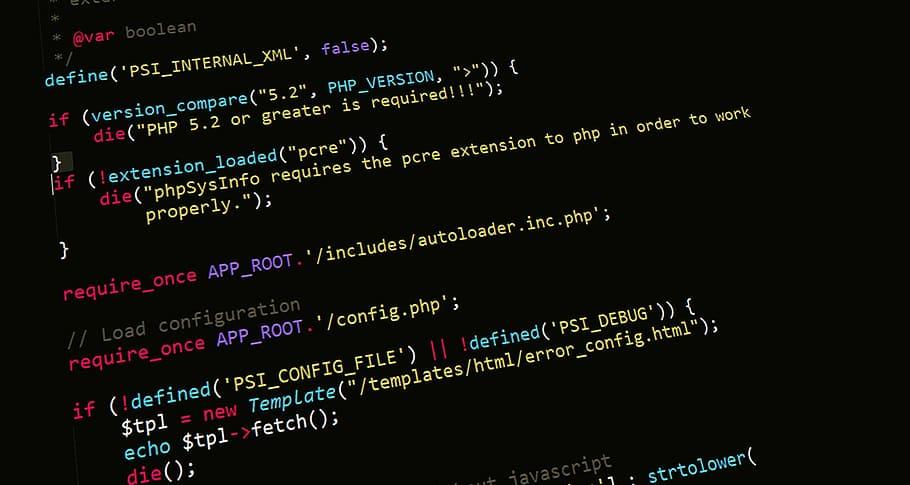The computer programming profession has been around for a long time and has progressed into a popular major. So how to become a computer programmer?
Obtaining a bachelor’s degree is the most common option to enter this field. However, there are other choices available to you.
We will give you a comprehensive guide to this career. Let’s follow our post and list what you should do first and what’s next!
What is a Computer Programmer?
Computer programming focuses on creating, maintaining, and updating software using programming languages such as Java, C++, or HTML.
Compared to other computer science subjects, such as computer graphics, which emphasizes visual arts, this field is more open-ended.
The core of this major is the programming language. It comes in numeric codes, which guide digital functions.

The programmers work with many types of programming languages, such as declarative, object-oriented, algorithmic languages, and more.
Computer programmers develop and analyze code that allows computer programs and software to work efficiently.
They turn software engineers’ and developers’ program designs into a series of instructions that computers can interpret.
What Does A Programmer Do?
Computer programmers are responsible for writing the code that runs software. They use different computer languages to create, evaluate, and debug programs.

Some focus on specific forms of software, such as mobile apps or SaaS (software as a service). The following are the duties of the programmers:
Translate programs into code
Software engineers and designers work collaboratively with coders to develop app designs. They convert these ideas into software code that computers can use to run the programs.
Master computer languages
Computer programmers must be competent in at least one coding language since they spend most of their working time writing code.
Most programmers use Java, C++, and JavaScript. Some also work with more modern languages such as Swift, Python, and Ruby.
Borrow from code libraries
The programmers actively seek more efficient ways to design programs since they create hundreds or even thousands of code lines at a time.
Most of them use code libraries, which include commonly used lines of code, to save time on writing each line from scratch.
Test and troubleshoot programs
These specialists test their products in addition to developing code to guarantee that they function efficiently.
They employ troubleshooting techniques to identify and address issues if they detect errors.
Use IDEs
The programmers also use integrated development environments (IDEs) to design and examine their works. Most IDE solutions involve code libraries, editors, and debuggers to identify and fix errors.
How To Become a Programmer
There are several vital steps to take if you want to pursue this career path. Your objectives may differ, but preparing for your future job is critical, no matter which route you choose.

1. Earn a degree
In the area of computer programming, well-rounded schooling is essential for success.
When determining which degree level to take, think about your job goals and how much time you’re ready to commit to education.
- Associate’s Degree
An associate’s degree might provide you with a solid foundation in the field. It can be enough for you to get you started in certain programming positions at the entry level.
A two-year degree can be a good option if you want to join the workforce sooner. You can then study toward an advanced degree afterward.
- Bachelor’s Degree
Most basic professions require a bachelor’s degree, which is a four-year curriculum. This degree will equip you to engage in several programming industries by providing you with all the necessary skills.
Information technology, network management, and software development are just a few majors available at many colleges.
A four-year degree will also offer a general education in other important subjects and critical thinking skills, all of which may help you progress in your job.
- Coding Bootcamp
A Coding Bootcamp is the best choice if you want to pursue a fast career move without prior expertise in software and web development.
These intensive courses will help you develop the core abilities you’ll need to thrive as a coder at the entry level. The courses provide you with the functional skills to find a job in months instead of years.
Because Coding Bootcamps aim to get students into the workplace as fast as possible, they will emphasize web development skills rather than coding as a whole.
2. Earn some certificates
Some businesses demand that you have certificates demonstrating your knowledge and skills.
Here are some of the most well-known certification organizations:
- Apple
Swift Certification, which requires taking an exam, is beneficial if you want to develop Apple products.
- C++ Institute
If you know how to program in C++, you might pursue the ++ Certified Associate Programmer or the C++ Certified Professional Programmer certifications.
The first emphasizes coding fundamentals and C++ syntax, while the second covers frameworks and problem-solving techniques.
- Oracle University
Oracle’s Java certification can assist you in mastering this commonly used language. To acquire the certificate, students must pass an exam.
- Python Institute
Certifications such as Certified Entry-Level Python Programmer and Certified Associate in Python can help you learn this language. Each one demonstrates a deeper understanding of Python.
- Ruby Association
Those who code in Ruby should get the Certified Ruby Programmer certification. Candidates must, however, complete a 50-question examination.
3. Develop your skills
You can gain the necessary skills while taking classes and sharpen them while working. There are two aspects to highlight: hard skills and soft skills.
Hard skills
As aforementioned, programming languages are the core of this field. They differ in their applicability and use, and increasing your expertise can help you climb your career ladder.
The world of coding languages is huge, but we can name some most popular, such as:
- Linux
- Java
- JavaScript
- C++
- ASP.NET
- C#
- SQL
- HTML

Soft skills
These skills typically come naturally. They help you connect effectively with coworkers and solve difficulties.
Verbal and written communication skills, creativity, curiosity, and the ability to work individually and in a group are all benefits for computer programmers.
- Communication
You must be able to communicate complicated technical ideas to coworkers and others in the company who are less knowledgeable.
- Multitasking
You will work on many jobs or parts of a bigger project simultaneously. Hence, you must arrange your tasks, fix problems as they occur, and perform multiple things at the same time.
- Organizational
This skill involves concentrating, devoting physical and mental energy to a job, and properly managing space and time.
- Attention to detail
With meticulous attention to detail, you can improve your efficiency, reliability, and competency. This skill allows you to deal with coding languages and program operations efficiently.
4. Look for job opportunities
Not all coders work in the same position. You might want to think about your ideal career path when you start mapping your route.
You’ll adjust your schooling to match your chosen expertise if you do so.
The front end, back end, and full-stack development are the three main paths that entry-level programmers can take.
Over half of the developers interviewed believe themselves to be back-end experts. More than a third defined themselves as front-end developers and 54.9% as full-stack devs.
5. Advance your skills
Without a doubt, the job market is highly competitive. Consider taking up an internship or contributing your skills to a nonprofit if you want to beef up your resume.

While you’re looking for your first full-time job, a tech internship might be a terrific opportunity to put your coding skills into practice.
Even if you have a full-time job, a part-time internship may give you lots of valuable work experience and fantastic references, which can help you advance in your job hunt.
Obtaining certifications in in-demand coding languages like Java and C++ may also be good.
Certifications can make way for the future and enhance your earning potential. Even better, you can earn these certificates at any time.
Although Coding Bootcamps may not always provide certification, they lay the groundwork for seeking certifications easily.
Career Opportunities for Programmers
This profession has remained in the top 13 highest-paying technology jobs. Consider your career prospects if you’re still unsure about pursuing a degree or training.

Salary
Most computer programmers are full-time employees. Their earning potential depends mainly on their experience, education, and expertise.
The location, type, and size of your company also affect your salary.
The average annual wage in the United States is $105,326. In other cases, salary ranges from $56,225 to $162,589 per year.
Demand
From 2020 to 2030, the number of job vacancies in this field is expected to decrease by -10%. However, there are greater chances in some regions of the country than in others.
The top three states for this employment are New York, Washington, and Illinois. They have the most job openings and higher average incomes than the national figure.
This career is an excellent career choice for individuals who excel at mathematics, logic and solving problems.
It also allows you to work from home by completing work online or connecting to servers that need debugging via the internet.
Frequently Asked Questions
While working on the learning curve, you must have many questions. Let’s check the ones from others to solve yours.
1. How long does it take to become a programmer?
You may need six months of customized, self-paced study or four years in a Bachelor’s degree.
However, the correct answer is contingent on you, your learning style, and your motivation.
2. Is it hard to be a computer programmer?
The short answer is yes. Learning to program computers entails mastering a set of languages and skills.
It is not simple to master rapidly, just like studying any other foreign language. Yet, it’s still possible to achieve significant progress in a short time.
The best part about this field is that it’s an ever-evolving profession. You’ll acquire new skills and put them into practice.
3. How fast can you learn to code?
If you want to learn how to code as soon as possible, you may do so in three months.
If you want to change jobs, a Coding Bootcamp and self-studying can teach you how to code for web development and data science in three months or less.
4. Does programming need math?
Math is necessary for any form of low-level graphics and game programming. You’ll need to master it before attempting any subject of the field.
You need mathematics to comprehend the sophistication of algorithms, but you won’t be inventing new algorithms in your first few years of coding.
5. What is the most valuable programming language to learn?
JavaScript is the most widely used programming language. Most web browsers employ it, and it’s also among the easiest coding languages to learn.
JavaScript requires absolutely no prior programming knowledge. Once you’ve learned it, you may directly practice and experiment with it.
6. Do programmers get paid well?
In 2023, the median income for computer programmers was $105,326. That year, the top 25% earned $162,589, whereas the bottom 25% earned $56,225.
Please note that the salary rate varies depending on many factors, such as the location and scope of your company.
Moreover, you can raise your income by expanding your knowledge, skills, and experience. The higher the position you work for, the more income you get.
Conclusion
Anybody can become a programmer. Make sure that you are passionate enough to devote your time to gaining and sharpening your skills.
Programming is a high-potential and approachable career option for persons with various experiences and job experiences.
Hopefully, our guide can help you with your learning and career path. If you need further information, please feel free to ask. Thank you for reading!
